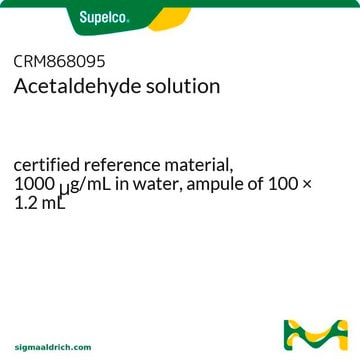About This Item
Recommended Products
biological source
synthetic
Quality Level
reg. compliance
FDA 21 CFR 177.2410
FDA 21 CFR 182.60
form
liquid
concentration
35.00-45.00% (titration by hydroxylamine)
40 wt. % in H2O
refractive index
n20/D 1.3771
density
0.868 g/mL at 20 °C
application(s)
flavors and fragrances
Documentation
see Safety & Documentation for available documents
food allergen
no known allergens
Organoleptic
ethereal
SMILES string
[H]C(C)=O
InChI
1S/C2H4O/c1-2-3/h2H,1H3
InChI key
IKHGUXGNUITLKF-UHFFFAOYSA-N
Looking for similar products? Visit Product Comparison Guide
Disclaimer
comparable product
Signal Word
Danger
Hazard Statements
Precautionary Statements
Hazard Classifications
Carc. 1B - Eye Irrit. 2 - Flam. Liq. 2 - Muta. 2 - STOT SE 3
Target Organs
Respiratory system
Storage Class Code
3 - Flammable liquids
WGK
WGK 3
Flash Point(F)
<-0.0 °F - closed cup
Flash Point(C)
< -17.78 °C - closed cup
Personal Protective Equipment
Choose from one of the most recent versions:
Already Own This Product?
Find documentation for the products that you have recently purchased in the Document Library.
Customers Also Viewed
Our team of scientists has experience in all areas of research including Life Science, Material Science, Chemical Synthesis, Chromatography, Analytical and many others.
Contact Technical Service




